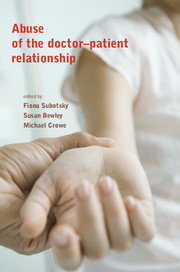Book contents
- Frontmatter
- Contents
- List of figures, tables and boxes
- List of contributors
- Foreword
- Introduction: mapping the territory
- 1 The ethical importance of boundaries to intimacy
- 2 The patient's perspective: impact and treatment
- 3 Teaching ethics and ethical behaviour to medical students
- 4 With the benefit of hindsight: lessons from history
- 5 The prevalence of boundary violations between mental health professionals and their clients
- 6 Psychiatry: responding to the Kerr/Haslam Inquiry
- 7 The general practitioner and abuse in primary care
- 8 Boundaries and boundary violations in psychotherapy
- 9 Sexual therapies: ethical guidelines, vulnerabilities and boundaries
- 10 Obstetrics and gynaecology: a special case?
- 11 Nurses as abusers: a career perspective
- 12 Medical management: governance and sexual boundary issues
- 13 Dealing with offending doctors: sanctions and remediation
- 14 Defending doctors: the protection society's experience
- 15 Regulation and its capacity to minimise abuse by professionals
- 16 The role of the General Medical Council
- Appendix 1 Extract from Vulnerable Patients, Safe Doctors
- Appendix 2 Codes of ethics of psychiatric associations in other countries
- Appendix 3 Guidance from the Council for Healthcare Regulatory Excellence
- Appendix 4 Examples of determinations by the General Medical Council's Fitness to Practise panels
- Appendix 5 Website resources and information
- Index
- Plate section
10 - Obstetrics and gynaecology: a special case?
Published online by Cambridge University Press: 02 January 2018
- Frontmatter
- Contents
- List of figures, tables and boxes
- List of contributors
- Foreword
- Introduction: mapping the territory
- 1 The ethical importance of boundaries to intimacy
- 2 The patient's perspective: impact and treatment
- 3 Teaching ethics and ethical behaviour to medical students
- 4 With the benefit of hindsight: lessons from history
- 5 The prevalence of boundary violations between mental health professionals and their clients
- 6 Psychiatry: responding to the Kerr/Haslam Inquiry
- 7 The general practitioner and abuse in primary care
- 8 Boundaries and boundary violations in psychotherapy
- 9 Sexual therapies: ethical guidelines, vulnerabilities and boundaries
- 10 Obstetrics and gynaecology: a special case?
- 11 Nurses as abusers: a career perspective
- 12 Medical management: governance and sexual boundary issues
- 13 Dealing with offending doctors: sanctions and remediation
- 14 Defending doctors: the protection society's experience
- 15 Regulation and its capacity to minimise abuse by professionals
- 16 The role of the General Medical Council
- Appendix 1 Extract from Vulnerable Patients, Safe Doctors
- Appendix 2 Codes of ethics of psychiatric associations in other countries
- Appendix 3 Guidance from the Council for Healthcare Regulatory Excellence
- Appendix 4 Examples of determinations by the General Medical Council's Fitness to Practise panels
- Appendix 5 Website resources and information
- Index
- Plate section
Summary
Background
Doctor–patient relationships are open to abuse in all medical specialties. The specialty of obstetrics and gynaecology, however, is unique for a number of reasons: all patients are female; most obstetric patients and many seeking family planning services and cervical screening are young and healthy; a positive relationship with a midwife, general practitioner (GP) or obstetrician during these early encounters with healthcare professionals may be a valuable learning experience for a woman and may influence a family's use of healthcare services for a generation; a negative experience may have destructive consequences. Pelvic examination, either digital or by speculum, is often an essential part of the assessment of most conditions in gynaecology and may also be necessary during labour. The situation therefore exposes the patient to a very specific potential for sexual abuse.
From puberty to extreme old age, women may suffer a variety of gynaecological discomforts and minor disorders that are troublesome rather than life-threatening. This puts women at risk of excessive intervention if they encounter a gynaecologist who is eager to operate for financial or other reasons. Early exposure to respectful doctor–patient relationships with informed, shared decision-making in general practice, family planning, gynaecology or colposcopy clinics enables a woman to deal appropriately with these gynaecological disorders throughout her lifetime.
Sexual misconduct in obstetrics and gynaecology
In 2003 and 2004, the Professional Conduct Committee (PCC) of the General Medical Council (GMC) heard a total of 28 cases that involved allegations of inappropriate sexual contact with patients, which accounted for 10% of all its new disciplinary cases (Department of Health, 2005). Three-quarters of the cases resulted in a finding of serious professional misconduct. As a result, in 2004, eight doctors had their names erased from the Medical Register. Two recent cases of doctors working in obstetrics and gynaecology who were struck off for sexual misconduct are reported by way of example in Boxes 10.1 and 10.2.
Box 10.1 Clifford Ayling
In December 2000 Clifford Ayling, a general practitioner and clinical assistant in gynaecology, who had trained to registrar level in obstetrics and gynaecology, was convicted on 12 counts of indecent assault relating to 10 female patients, and sentenced to 4 years’ imprisonment. The complaints of indecent assault related to inappropriate touching of breasts or gynaecological organs during the course of medical examinations.
Source: Department of Health (2004).
- Type
- Chapter
- Information
- Abuse of the Doctor-Patient Relationship , pp. 114 - 126Publisher: Royal College of PsychiatristsPrint publication year: 2010



